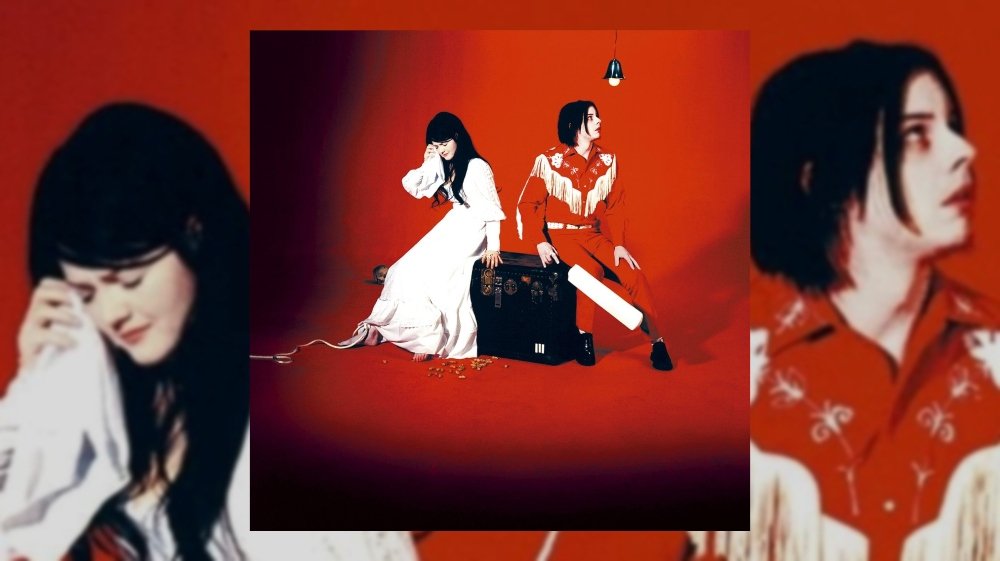Happy 20th Anniversary to The White Stripes’ fourth studio album Elephant, originally released April 1, 2003.
Using only an 8-track recorder, The White Stripes’ fourth album Elephant is a true back-to-basics moment. Selling over four million copies and nominated for an Album of the Year GRAMMY award, Jack and Meg White proved humble tools can build an exceptional product. 2003’s Elephant was a uniquely authentic record during a time of stylized garage and nü metal bands popping up on ‘TRL.’ Coming from the Midwest and having a strong commitment to music with uncomplicated accessibility, The White Stripes feel unquestionably American. Even their quirks—insistence on being called siblings, costume-like wardrobes—feels natural and nostalgic 20 years later.
Despite being most well-known for his guitar playing, Jack White opens “Seven Nation Army” with a distinct bassline, an effect achieved by using a distortion pedal on his ubiquitous guitar. The basic riff and spare drumming are key to the track’s immense popularity—simple sounds easily echoed by an arena full of fans. In a recent interview with Conan O’Brien, Jack White muses on the song’s international renown as a stadium anthem. “It’s not mine anymore,” Whites explains. “It becomes folk music when something like that happens.
In case “Seven Nation Army” isn’t sufficiently loud, “Black Math” the album’s second track is another raucous banger. A callback to the band’s more straightforward rock and roll, a la White Blood Cells (2001), other tracks like “Little Acorns” and “Girl, You Have No Faith in Medicine” set the stage for Jack White to show off his guitar virtuosity. His Little Richard-esque energy sets the speed to full-throttle, in between more down-tempo, twee moments that feel specific to that era.
The Stripes’ special brand of goofy self-parody pops up throughout Elephant, and is helpful in promoting their “sweetheart” aesthetic. Never one to shy from a cheeky cover song, “I Just Don’t Know What to Do With Myself” is Jack White doing his best heartthrob crooner with the Dusty Springfield/Burt Bacharach classic. Tracks like “I Just Don’t Know What To Do Myself” and “You Got Her In Your Pocket” speak to the album’s theme of “the death of the American sweetheart” or White’s perceived cultural shift towards everyone working too hard to be “cool.” This particular earnestness was refreshing in 2003 and feels just as special in 2023 where the climate is similarly cynical.
Listen & Watch (Playlist):
The heartthrob also appears in desperate love songs like “I Want To Be The Boy To Warm Your Mother’s Heart,” another treacly plea for love backed by roaring guitar riffs. But Elephant isn’t strictly about romance. Classic blues riffs sound more like a slick homage than cheesy imitation on “Ball and Biscuit.” Jack White seems to hollow out classic blues tracks and then repurpose them in the garage rock motif, a perfect job for a son of Detroit. The White Stripes wear this Midwestern pride like a letterman jacket, sprinkling townie Easter eggs throughout their album, like on “Little Acorns.” With an opening monologue from a legendary Detroit anchorman, Mort Crim, the song is a good, Christian morality tale with a punk rock edge, a nod to their Motor City lineage.
Speaking of their prolific stature, there are still debates ongoing today about Meg White’s drumming and her impact on the band. But tracks like “In The Cold, Cold Night,” perfectly exemplify her musical chops, where she brings a haunted, feminine air to a track that doesn’t need Jack’s rambunctious energy. It’s a spare punk ballad and the only track with Meg White suspending her drumming duties and taking on vocals. Her slightly off-key cry feels cool and eerie, creating much-needed atmosphere in the minimal track.
In their 2003 review, Pitchfork asks, “How do you combine the shit-hot with the ‘twee?”—a question that perfectly encapsulates a dilemma plaguing the rock world. While nihilistic nü-metal outfits implored their listeners to “break shit,” Elephant is a classic example of the more life-affirming, romantic tradition of American rock and blues. Twenty years later, the Stripes’ guitar riffs still feel evergreen and at any moment you can hear a chant of “ohhh, oh, oh, oh, ohhh, oh,” from packed stadiums around the globe.
LISTEN:

